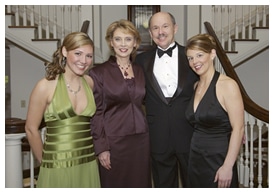The Candidate’s Spouse – Perspectives from the Campaign Trail
September 9, 2009
By Kathy Groob Publisher, ElectWomen Magazine
 When I ran for office, my husband would jokingly refer to himself as “Mr. Kathy.” He laughed it off, but I was cognizant of how invisible he felt at times, always in the background, always standing by supportive in his role as the candidate’s spouse. Especially for women candidates, the spouse role can be a tricky one to define. A husband can’t appear to controlling or domineering or it makes the woman candidate seem like she can’t do it alone. He can’t appear too wimpy or quiet or it will seem like she “wears the pants” in the family. So what’s the right role; what does the ideal candidate’s spouse look like?
When I ran for office, my husband would jokingly refer to himself as “Mr. Kathy.” He laughed it off, but I was cognizant of how invisible he felt at times, always in the background, always standing by supportive in his role as the candidate’s spouse. Especially for women candidates, the spouse role can be a tricky one to define. A husband can’t appear to controlling or domineering or it makes the woman candidate seem like she can’t do it alone. He can’t appear too wimpy or quiet or it will seem like she “wears the pants” in the family. So what’s the right role; what does the ideal candidate’s spouse look like?
Some male spouses take on the role of business manager, taking care of financial matters, organizing and putting up signs and participating in strategy meetings. Typically female spouses support their husbands by taking care of details for events, making phone calls, writing postcards, baking cakes and keeping the household and family going while the husband campaigns.
 Washington D.C. media and speech coach, Chris Jahnke says the higher-level races become even dicier for husbands of female candidates. “It can be tricky particularly when women are running for chief executive positions like governor or President. There was a great deal of speculation about what Bill would be called if Hillary were elected President. Would he be the First Man or what?”
Washington D.C. media and speech coach, Chris Jahnke says the higher-level races become even dicier for husbands of female candidates. “It can be tricky particularly when women are running for chief executive positions like governor or President. There was a great deal of speculation about what Bill would be called if Hillary were elected President. Would he be the First Man or what?”
 In Alaska, Sarah Palin settled on “First Dude” for her husband. Washington Governor Chris Gregoire refers to her husband as “First Mike.” In Kentucky, there is a beautiful case of dolls on display in the capitol that show each first lady in her inaugural gown. Instead of a “Ken doll” replica of Governor Martha Layne Collins’ husband in his tuxedo, there stands the Governor herself in her ball gown. Despite being a governor, she is displayed along with all the first ladies and the first gentleman is nowhere to be found.
In Alaska, Sarah Palin settled on “First Dude” for her husband. Washington Governor Chris Gregoire refers to her husband as “First Mike.” In Kentucky, there is a beautiful case of dolls on display in the capitol that show each first lady in her inaugural gown. Instead of a “Ken doll” replica of Governor Martha Layne Collins’ husband in his tuxedo, there stands the Governor herself in her ball gown. Despite being a governor, she is displayed along with all the first ladies and the first gentleman is nowhere to be found.
“When Bev Perdue was elected governor in North Carolina one of the first things the press asked her about was her redecorating plans for the mansion,” explains Chris Jahnke. She told them, “There is a bronze plaque set in the wall out front of the mansion. It welcomes visitors to the home of the governor and the first lady. I intend to redecorate that!” “On the campaign trail, the male spouse should never upstage the candidate in any way. For some husbands this can take quite a bit of adjustment, realizing that they are the second fiddle and need to stay in the background,” said Jahnke.
Political consultant Angie Cain describes the role of the female candidate’s spouse in this way, “he should simply continue to play his role as a spouse. The spouse should not become involved in managing the campaign or the candidate… that should be left up to the professionals hired to run the race. Spouses should, of course, be very supportive and be the candidate’s most loyal volunteer. That means taking very active roles in the campaign such as attending events, making phone calls, knocking on doors and putting up yard signs (not to mention being helpful in the home while the candidate is out on the campaign trail). Spouses should be prepared and willing to accept the fact that their family life will be much different for several months during the campaign. Both spouses must fully commit to sacrifice a lot of time and effort in order to be successful on Election Day.”
 As a mother of two boys, Judge Kathleen Lape couldn’t have run for re-election without the support of her husband. “My husband Mike is a physician with a demanding schedule but spent every free moment of his time on the campaign trail and taking care of our two boys. He put up signs, drove the truck in parades, managed the kids during parades, took care of scraped knees, and he promoted me endlessly to anyone who would listen– staff, colleagues, patients and to total strangers. So many people told me they would see Mike putting up signs, even in a driving rain, while dressed in his scrubs, late at night—he did whatever it took to put up campaign signs. He can put up a 4’x6’ sign in less than 10 minutes, stakes and all.”
As a mother of two boys, Judge Kathleen Lape couldn’t have run for re-election without the support of her husband. “My husband Mike is a physician with a demanding schedule but spent every free moment of his time on the campaign trail and taking care of our two boys. He put up signs, drove the truck in parades, managed the kids during parades, took care of scraped knees, and he promoted me endlessly to anyone who would listen– staff, colleagues, patients and to total strangers. So many people told me they would see Mike putting up signs, even in a driving rain, while dressed in his scrubs, late at night—he did whatever it took to put up campaign signs. He can put up a 4’x6’ sign in less than 10 minutes, stakes and all.”
“On the home front, my husband took up the slack for me,” added judicial candidate Kathleen Lape. “He made sure homework was completed, teeth were brushed, lunches were packed and that uniforms were clean. Mike also took very good of the candidate – me. He made sure I took vitamins, remained healthy, ate breakfast every morning and got enough sleep (when I could). Each morning he would pack a cooler with water and snacks so that I could be out knocking on doors right after court finished each afternoon. He packed that cooler everyday for four months!”
 The perspective of being the candidate’s wife can be equally challenging. Cleveland Plain Dealer columnist and Pulitzer Prize winner, Connie Schultz learned all about being the candidate’s spouse during her husband, Sherrod Brown’s campaign for the U.S. Senate in 2006. In her book, ….and His Lovely Wife, Schultz describes the feeling of being anonymous the first few times she was referred to as Sherrod Brown’s lovely wife. She describes in detail her feelings about losing her identity as an accomplished reporter and becoming “the candidate’s wife.” While struggling early on during the campaign, Connie Schultz began to engage in the process and became an asset to the campaign by traveling throughout Ohio, giving speeches and stumping for her husband. Sherrod Brown won the race and Schultz returned to her job at the Cleveland Plain Dealer. In … and His Lovely Wife, Connie Schultz proves beyond all doubt that she’s more than just a pretty face.
The perspective of being the candidate’s wife can be equally challenging. Cleveland Plain Dealer columnist and Pulitzer Prize winner, Connie Schultz learned all about being the candidate’s spouse during her husband, Sherrod Brown’s campaign for the U.S. Senate in 2006. In her book, ….and His Lovely Wife, Schultz describes the feeling of being anonymous the first few times she was referred to as Sherrod Brown’s lovely wife. She describes in detail her feelings about losing her identity as an accomplished reporter and becoming “the candidate’s wife.” While struggling early on during the campaign, Connie Schultz began to engage in the process and became an asset to the campaign by traveling throughout Ohio, giving speeches and stumping for her husband. Sherrod Brown won the race and Schultz returned to her job at the Cleveland Plain Dealer. In … and His Lovely Wife, Connie Schultz proves beyond all doubt that she’s more than just a pretty face.
Chris Jahnke describes a media training session she did for Karen Shepherd back in 1992 when she ran for Congress from Utah (she won.) “Her husband attended the session and wanted to know what he should do when Karen was being interviewed on television. He asked me if he should stand next to his wife with his arm around her to demonstrate his support. We decided against that.”
Although the role of the candidate spouse varies from race to race, the reality is that the campaign is about the candidate and spouses at many times can feel like window dressing. As more women run for office, the rules for spouse involvement will change. Dozens of books have been written about how to run for office, but there is no handbook for how to be the spouse of a candidate. First, do no harm is the best motto and remember that everything in the campaign affects them just as much as the candidate.
Kathy Groob is a former elected city councilmember and candidate for the Kentucky senate. She is a political and business consultant and the founder of ElectWomen. For more information, visit: http://electwomen.com.

